The OCZ Vertex 3 Review (120GB)
by Anand Lal Shimpi on April 6, 2011 6:32 PM ESTRandom Read/Write Speed
The four corners of SSD performance are as follows: random read, random write, sequential read and sequential write speed. Random accesses are generally small in size, while sequential accesses tend to be larger and thus we have the four Iometer tests we use in all of our reviews.
Our first test writes 4KB in a completely random pattern over an 8GB space of the drive to simulate the sort of random access that you'd see on an OS drive (even this is more stressful than a normal desktop user would see). I perform three concurrent IOs and run the test for 3 minutes. The results reported are in average MB/s over the entire time. We use both standard pseudo randomly generated data for each write as well as fully random data to show you both the maximum and minimum performance offered by SandForce based drives in these tests. The average performance of SF drives will likely be somewhere in between the two values for each drive you see in the graphs. For an understanding of why this matters, read our original SandForce article.
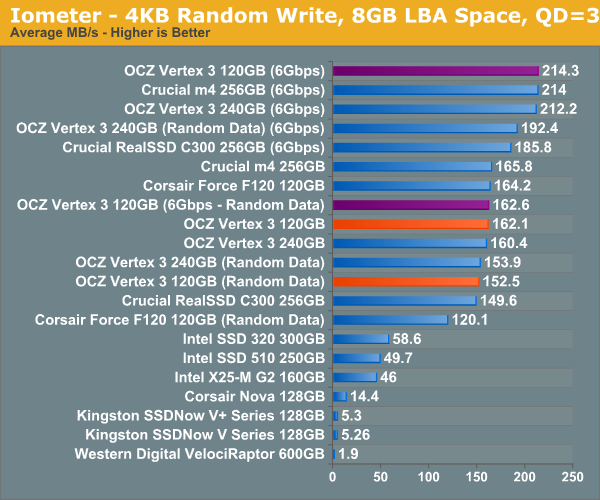
Peak performance on the 120GB Vertex 3 is just as impressive as the 240GB pre-production sample as well as the m4 we just tested. Write incompressible data and you'll see the downside to having fewer active die, the 120GB drive now delivers 84% of the performance of the 240GB drive. In 3Gbps mode the 240 and 120GB drives are identical.
Many of you have asked for random write performance at higher queue depths. What I have below is our 4KB random write test performed at a queue depth of 32 instead of 3. While the vast majority of desktop usage models experience queue depths of 0 - 5, higher depths are possible in heavy I/O (and multi-user) workloads:
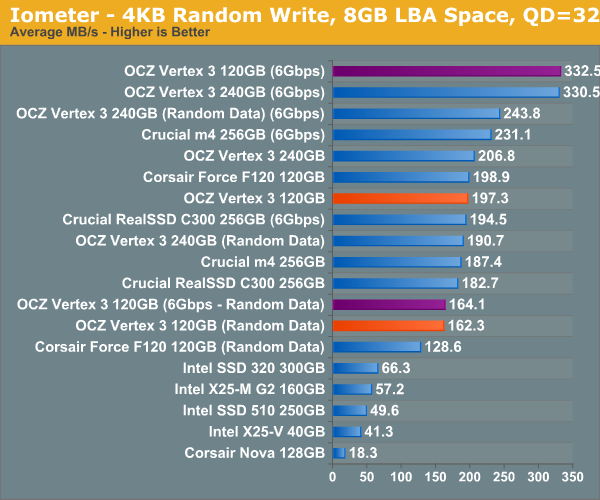
At high queue depths the gap between the 120 and 240GB Vertex 3s grows a little bit when we're looking at incompressible data.
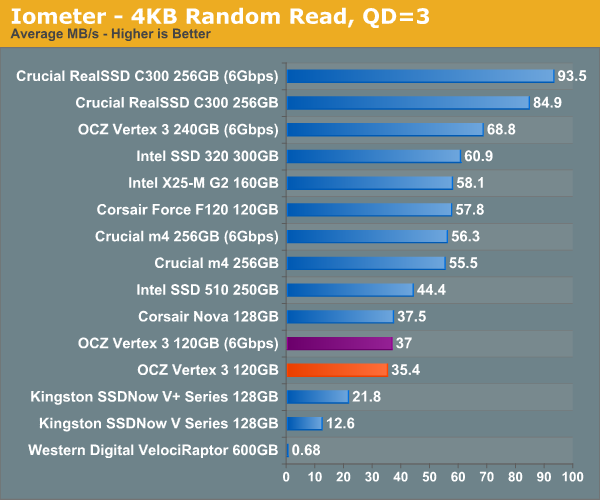
Random read performance is what suffered the most with the transition from 240GB to 120GB. The 120GB Vertex 3 is slower than the 120GB Corsair Force F120 (SF-1200, similar to the Vertex 2) in our random read test. The Vertex 3 is actually about the same speed as the old Indilinx based Nova V128 here. I'm curious to see how this plays out in our real world tests.
Sequential Read/Write Speed
To measure sequential performance I ran a 1 minute long 128KB sequential test over the entire span of the drive at a queue depth of 1. The results reported are in average MB/s over the entire test length.
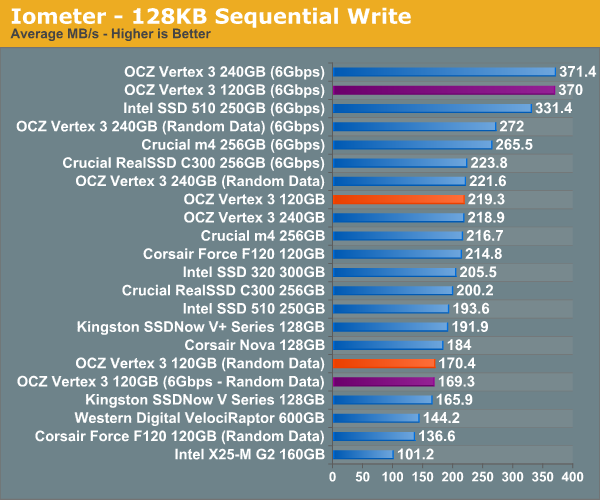
Highly compressible sequential write speed is identical to the 240GB drive, but use incompressible data and the picture changes dramatically. The 120GB has far fewer NAND die to write to in parallel and in this case manages 76% of the performance of the 240GB drive.
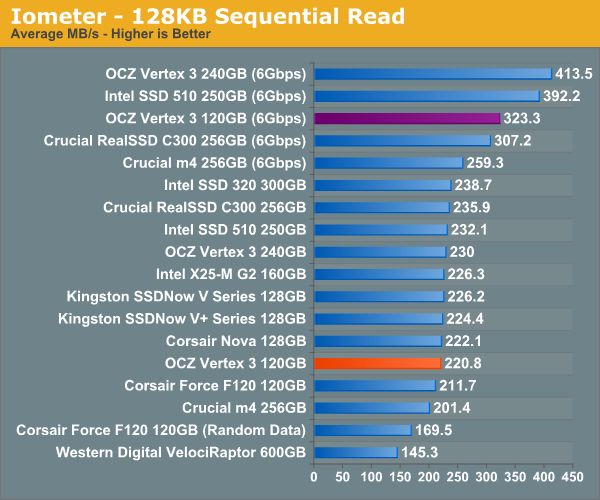
Sequential read speed is also lower than the 240GB drive. Compared to the SF-1200 drives there's still a big improvement as long as you've got a 6Gbps controller.










153 Comments
View All Comments
SolidSteel144 - Wednesday, April 6, 2011 - link
Why weren't other controllers tested?AMD's SB850 should also be able to handle these drives at full speed.
A5 - Wednesday, April 6, 2011 - link
If you go back and look at the Sandy Bridge launch article (http://www.anandtech.com/show/4083/the-sandy-bridg... you'll see that the Intel and AMD controllers have essentially identical performance. No reason to double his benchmark time for a 1% difference.acripps - Wednesday, April 6, 2011 - link
Newegg should have one to my door tomorrow......The last drop of my yule spending authorization. It will spend the next few years drifting through various machine incarnations....till it passes out of the pool in a give-away pc....somewhere around 2014.watzupken - Wednesday, April 6, 2011 - link
Following this issue I had with them, there won't be another OCZ product from me. Anand did point out a good thing that this issue is far from over since OCZ left buyers like myself and others out in the cold in the exchange. So other than the 60 and 120GB drives, no other drives are eligible for an exchange. Worst case, I got the affected drive back due to an exchange as the earlier drive failed. I return fast drive, get a slow drive back. How nice.devlabz - Wednesday, April 6, 2011 - link
Last few articles I ended up wondering why random read speed in SF controllers is slower than random write. I may have missed some important article explaining all that stuff, tho i read all of them. Isn't flash technology favoring the read speeds? Or it have something to do with lookups for the random data chunks?Most likely this will be the year where I'll try to get a SSD drive, and since my main reason will be to reduce the compilation times of my projects and I think that my biggest gain will be with highest random read IOPs drive? Am I wrong here? Or will it matter that much actually?
FunBunny2 - Wednesday, April 6, 2011 - link
I've read, don't remember where, that the IMFT 25nm NAND has on-die ECC circuitry. So:- did you find such
- is OCZ, or anyone, exercising it
???
Movieman420 - Wednesday, April 6, 2011 - link
Yeah...Tosh also just introduced their 'built-in ECC' nand.http://www.techpowerup.com/143619/Toshiba-Debuts-S...
The thing is, from what I understand anyway, that this nand will take the ECC burden off the controller. Thing is tho that SandForce controllers actually accell at ECC duties vs other controllers. This is a major selling point because as the die process continues to shrink, the ECC burden will continue to increase. So I guess I'm saying that I'm not too sure that more expensive ecc-nand would be practical if the controller doesn't suffer from the increasing ECC issue. Someone with more knowledge about how the SF controller works could probably answer the question best...cough*Anand*cough. ;)
Movieman420 - Wednesday, April 6, 2011 - link
The dismal performance of the Hynix nand was news to me. It does however explain why there were many users with horrid performance posting on the Ocz forums. I suspect these were the ones who where told that the problem was with their PC/Lappy. It has never once been mentioned on the forum that some drives may have low performing nand inside. No wonder they kept reminding folks not to open their drives 'due to potential warranty issues'. It seems Ocz was being less than forthcoming even before the whole 25nm nand thing blew up. I really really REALLY hope that Ocz puts an end to the shady business we've seem for the last few months...they are a great company with a great product. Omission and/or deception isn't gonna fly, especially when you cater to enthusiasts who are not exactly stupid. It's those same 'enthusiasts' who made Ocz's early success possible in the first place. I know that things have since changed and now the vast majority of their sales are to commercial and enterprise customers. They'd never think of pulling this with those customers, but they'll do it to the very people who made their early success possible in the first place? This post and my previous one come from the prospective of a die hard customer who also happens to be an Ocz shareholder as well. Just wish I could afford enough to actually have a say so in the way things go down. :Pxboxist - Wednesday, April 6, 2011 - link
Anand,I'm a very casual hardware enthusiast, and admittedly most of the technical aspects discussed in this article eludes me.
With that said, I don't need to understand everything to continue to be impressed by your enthusiasm for the products in your industry, and the way you carry yourself as an ambassador for all of your users. The way you went after OCZ here has to be applauded.
fixxxer0 - Wednesday, April 6, 2011 - link
after being disappointed in some way with just about every (large) company i've dealt with, whether it be insurance, auto makers, electronics, appliances, you name it... i am glad to see one finally accepting responsibility, and doing the right thing.i do not expect 100% perfection from every company at all times. i know sometime things are DOA, or defective, or flawed. but to actually have a company take that extra step and make it right without you having to sue them is commendable.
personally, when it comes time on deciding which drive to go with, it will mainly be on the numbers, but OCZ's ethics will definitely give them the edge if there is a toss up.